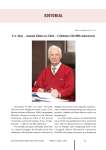Editorial. Рубрика в журнале - Economic and Social Changes: Facts, Trends, Forecast
Статья научная
February 24, 2022, after the recognition of the independence of the Donetsk People’s Republic and the Luhansk People’s Republic (February 22, 2022), Russian President Vladimir Putin announced the beginning of a special military operation on the territory of Ukraine. The head of state noted in his address to Russians that the purpose of the operation was “to protect people who, for eight years now, have been facing humiliation and genocide perpetrated by the Kiev regime. To this end, we will seek to demilitarize and denazify Ukraine, as well as bring to trial those who perpetrated numerous bloody crimes against civilians, including against citizens of the Russian Federation”. The RF President’s decision announced the beginning of a new stage in Russia’s development in the 21st century and launched large-scale and irreversible changes concerning not only our country, but also the whole world. The global historical confrontation between Russia and the US-led NATO countries (between Russia and the Collective West) has entered an active phase, accompanied by a sharp aggravation of international political relations, sanctions policy, and armed clashes. We (relying, as usual, on expert opinions, official statistics and sociological surveys) express our own point of view on the events taking place in the world and in Russia, analyze their nature, causes, and implications.
Бесплатно
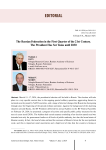
Статья научная
March 15-17, 2024, the presidential election will be held in Russia. The election will take place in a very specific context due to the ongoing special military operation, aggravating threats to national security posed by NATO countries, and a range of internal changes that Russia has been going through since the beginning of the special military operation. Against the background of the alarming situation around Russia, the RF President delivered his annual Address to the RF Federal Assembly on February 29, 2024; he presented a program of actions and specific public policy measures for the next six years (until 2030). The Address had certain aspects reminding of an election speech and was intended not only for government bodies at all levels of public authority, but also the broad strata of Russian society. In fact, the head of state outlined the contours of Russia’s future for the next political cycle, and this is important amid uncertainty and a high level of risks that the country is facing at the present historical moment (after the start of the SMO). The article presents our own approach to analyzing the current situation in the country (including the 2024 presidential election), based on our long-term monitoring of public administration effectiveness, the system-wide nature of which is determined by the comprehensiveness of the empirical base (analysis of national and regional statistics, including those of own compilation; sociological surveys, analysis of expert assessments and key decisions taken by the President and the RF Federal Assembly). Scientific novelty of the study lies in a comprehensive analysis of the effectiveness of public administration during Vladimir Putin’s first four presidential terms (2000-2024), that is, during the first quarter of the 21st century. In this context, we analyze general goals, objectives, and principles of public administration formulated by Vladimir Putin as he assumed office as president for the first time; key initiatives and decisions he adopted in order to address the tasks set; internal and external conditions in which the head of state had to achieve national development goals; key stages that the country went through over the past 23 years; and the main results with which it “approached” the beginning of a new political cycle.
Бесплатно
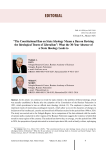
Статья научная
In the article, we continue to reveal the topic related to the problem of liberal ideology, which was actually established in Russia after the adoption of the Constitution of the Russian Federation in 1993, which proclaimed a ban on official state ideology (Article 13). The emphasis is placed on the empirical results of monitoring sociological research, which allow us to see the dynamics of changes in indicators of the intellectual, creative and moral level of Russian society for the period from 1996 to 2024. The study was carried out in the Vologda Region, but a comparison of the data obtained with the results of opinion polls conducted in other regions of the Russian Federation suggests the existence of identified trends in many regions of the country. The analysis has shown that, on average, over the period from 1996 to 2024, the proportion of people interested in various topics about life, such as family, culture, upbringing of younger generations, the life of the country and society, etc. decreased by 11 percentage points. The proportion of people who do not tend to engage in creative activities in everyday life has increased by 15 percentage points. The proportion of people experiencing remorse in the case of committing certain immoral acts (deception, rudeness, injustice, etc.) decreased by 8 percentage points. The generalization of expert assessments given in the article indicates that the cause of negative trends is largely the ideology of liberalism, which is based on the ideas of consumerism and money as the leading values in life, the understanding of benefit as the only driving force of social development. Special emphasis is placed on the values and behaviors of the ruling elites, who continue to adhere to the basic tenets of liberal ideology, which, in the context of the special military operation, leads to extremely negative consequences for the country and creates real threats to national security. Some of the ruling elites are still guided by liberal attitudes that contradict traditional spiritual and moral values such as justice, patriotism, and the priority of the spiritual over the material, which are contained in Presidential Decree 809 of November 9, 2022. Therefore, there is a growing need in the expert community and among the general public for a real understanding of the answer to the question “What kind of state are we building?” Our contribution lies in the analysis and interpretation of the database of sociological data accumulated from 1996 to 2024 in the context of current problems of public administration effectiveness.
Бесплатно
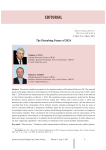
Статья научная
The article considers prospects for the implementation of Presidential Decree 204 “On national goals and strategic objectives of development of the Russian Federation for the period up to 2024” dated May 7, 2018 and for the implementation of key guidelines announced by the head of state in his Address to the Federal Assembly on March 1, 2018. We considered expert assessments, analyzed the Russian President’s annual phone-in session with the nation (the “Direct Line”) held on June 7, 2018, and discussed the results of international research and all-Russian sociological surveys. All this allows us to conclude that if the composition of the Cabinet remains virtually unchanged for the next six years, it will be extremely difficult to implement ambitious plans for the internal development of the country. According to many experts, if we want to achieve breakthrough development, it is necessary to change the Government radically. This is dictated by the current geopolitical situation and the expectations of the general population. Nevertheless, at the beginning of his fourth presidential term Vladimir Putin has not taken such steps; consequently, it is unlikely that he will fulfill his election promises. It rather allows us to say that “oligarchic capitalism” will continue to dominate in the system of public administration.
Бесплатно
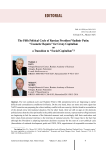
Статья научная
The new political cycle and Vladimir Putin’s fifth presidential term are beginning in rather difficult and contradictory conditions for Russia. On the one hand, there are more and more signs that NATO countries are preparing for a direct military conflict with our country; this fact leads to an escalation of the already tense international situation. On the other hand, there are still no signs in the domestic political arena that the elites (primarily in the public administration system, representatives ofbig business) are beginning to feel the essence of the historical moment and, accordingly, shift their motivation and their values from personal interests to the interests of national security. The reason lies in the fact that although the President is adopting important decisions necessary for the start of a new political cycle (formulation of national development goals until 2030, 2036, appointment of responsible executors for their implementation), he has not given an answer to the question of what kind of State we are building. The State of “social capitalism” or “crony capitalism”? The need for an answer to this question (and specifically from the President) has been maturing in society for many years and has now reached such a degree of relevance that it became the subject of a plenary discussion with the participation of the head of state at the Saint Petersburg International Economic Forum, held in Russia on June 5-8, 2024. However, at the Forum, there was still no response from the President to this question; so many experts (mostly reflecting the opinion of the majority of the country’s population) remain in a state of anxious expectation about where Russia is going; whether the country has a clear understanding of the image of the future, which is necessary for the successful achievement of all the goals of the special military operation and for building the contours of a new Social Contract that should replace what can be called the paradigm of semi-colonial dependence on the West... The article uses an extensive database in the form of expert opinions, facts, and monitoring sociological surveys results. Scientific novelty of the approach consists, first of all, in a combination of various aspects of the social and political life of the country, which become the subject of our analysis. Among them are specific administrative decisions of the head of state, assessments of public opinion, views of representatives of big business, opinions of State Duma deputies, political and public figures, historians, economists, etc. In particular, the article presents the results of the vote in the lower house of Parliament on the approval of candidates for new members of the Government of the Russian Federation, as well as data from the open accounts of a number of large metallurgical corporations, indicating that the priorities of their activities do not correspond to the challenges that Russia has faced after the beginning of the special military operation.
Бесплатно
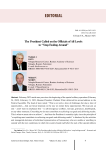
The president called on the officials of all levels to “stop fooling around”
Статья научная
February 2023 marks one year since the beginning of the special military operation (February 24, 2022). February 21, 2023, Russian President Vladimir Putin delivered his annual address to the Federal Assembly. The head of state noted: “This is not only a time of challenges but also a time of opportunities… And our future depends on the way we realize these opportunities. We must put an end - and I want to emphasize this - to all interagency conflicts, red tape, grievances, doublespeak, or any other nonsense. Everything we do must contribute to achieving our goals and delivering results. This is what we must strive to achieve”… And here the President is certainly right, since the principle of “everything must contribute to achieving our goals and delivering results” is hindered by the activities and managerial decisions of individual representatives of bureaucracy who are unable or unwilling to comply with the new conditions in which the country found itself after the start of the special military operation. In the article, we carry on analyzing the situation in Russia, key steps taken by the President in the face of increasing threats to national security, trends in public opinion and individual facts of real life that contradict the dominant national-patriotic trend of social sentiment and the tasks set by the President after February 24, 2022. The information base for our research includes assessments by experts from various fields, results of monitoring sociological surveys, and public speeches of the head of state since 2000. One of our main conclusions is that the future of Russia, the real formation of a new Social Contract, which is possible only after Russia’s victory in the special military operation and which consists in building a sovereign social state based on traditional spiritual and moral values and the principle of social justice, should begin with the mobilization of elites, elimination of “contradictions, formalities and other nonsense”; and the head of state can and should be the initiator of this process.
Бесплатно
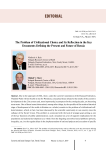
Статья научная
Due to the approach of 2024, when, under the current Constitution of the Russian Federation, Vladimir Putin will not be able to run for President, conceptual issues related to the results of the country's development in the 21st century and, most importantly, its prospects for the coming decades, are becoming more acute. One of these issues (determined, among other things, by the specifics of the modern historical stage of development of the world civilization as a whole) consists in the problem of civilizational self-determination, which, in fact, has been discussed by the scientific community in our country since the collapse of the Soviet Union. This problem is connected with the lack of strategic goal-setting as one of the key functions of public administration; such a situation has a lot of negative implications for the population and national development as a whole: from the lingering unresolved social problems (poverty, inequality, etc.) to the regular delays in the implementation of national projects and execution of specific orders of the head of state. In addition, according to the results of federal and regional studies, Russian society does not have a distinct cultural and value-based vector of development; moreover, against the background of the relentless need to increase the standard of living and achieve social justice, Russian society is increasingly becoming a consumer society with all its key shortcomings such as obsession with the material component of life, the desire to achieve personal success, ignoring the historically established norms of morality, etc. In the context of the issue of civilizational choice becoming more important as well as a wide range of problems caused by its absence, we analyze the Constitution of the Russian Federation and the National Security Strategy of the Russian Federation - the key federal documents that reflect basic principles of the existing dynamics and future prospects of national development. We come to the conclusion that the ruling elites do not work to form the spiritual and moral foundations of Russian society; consequently, the goals they set are focused on solving material problems only, which makes public administration similar to corporate governance. This poses one of the key threats to national security and national development and makes it necessary to hold a broad discussion initiated primarily by the government and aimed to consider practical possibilities and prospects for the implementation of the basic principles of the social state contained in the Constitution of the Russian Federation.
Бесплатно
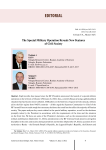
The special military operation reveals new features of civil society
Статья научная
Eight months have passed since the RF President announced the launch of a special military operation on the territory of Ukraine (February 24, 2022); thus, currently Russia is facing a global political situation that has become more turbulent. Difficulties on the front line, frequent terrorist attacks, military aid to the Kiev regime from NATO countries all this urged the Supreme Commander-in-Chief of the RF Armed Forces to make tough but necessary decisions that could not but affect the majority of Russian society. The paper analyzes key events related to the special military operation, as well as the decisions promptly taken by the President in accordance with the requirements of the time and the situation on the front line. We focus on some of the President’s decisions, such as the announcement of partial military mobilization (September 21, 2022); amendments to the RF Criminal Code aimed to strengthen discipline in the army and society during martial law and wartime (September 24, 2022); accession of new territories to Russia - the Donetsk People’s Republic, the Lugansk People’s Republic, the Kherson and Zaporozhye oblasts (October 5, 2022); large-scale precision missile strikes on Ukrainian infrastructure, military communications and command posts (October 10, 2022); introduction of martial law in the new constituent entities of the Russian Federation and the establishment of special measures to ensure security of all regions of the Russian Federation (19 October 2022). We analyze public opinion trends and the results of the Single Voting Day (September 11, 2022), which are considered as indicators of public sentiment in the hard times that our country is facing. On the whole, our research has shown that the alarming political situation on the global arena, as well as the tough decisions adopted by the head of state in recent months, revealed new features in Russian civil society, provoked changes in the people’s internal awareness of the scale of threats to national security. This, in particular, was expressed in the following: many Russians are participating in the special military operation as volunteers; volunteer aid is increasing; in society, there is strong condemnation of those who left Russia after the start of the special operation; all the social strata are consolidating around the RF President; the above trends are observed in the dynamics of public opinion assessments. All these factors can play an important role in Russia’s crossing its internal Rubicon in the form of the reorientation of broad strata of Russian society, and above all its elite groups, from the Western development dogmas imposed during the 30th anniversary of the market transformation toward nationally oriented goals and values.
Бесплатно
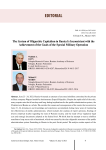
Статья научная
June 23-24, 2023, Russia witnessed an attempt of an armed rebellion committed by the private military company Wagner headed by businessman Evgenii Prigozhin. Despite the rapid relief of the crisis, many experts note that it has deep and long-lasting implications for the public administration system, the President and Russia as a whole. We consider the causes and consequences of the events that occurred on June 23-24, drawing on our knowledge and experience accumulated during many years of monitoring the effectiveness of public administration, which includes the analysis of expert opinions, findings of diverse empirical studies regarding the state of Russian society, and the study of key regulatory legal acts and strategic documents adopted at the federal level. We think that the attempt to start a rebellion manifests a long-term crisis of statehood, which was caused by the clan-oligarchic structure of the public administration system flourishing in Russia in the post-Soviet period. We analyze certain aspects of the formation of the worldview of the modern extremely liberal ruling elite, provide concrete facts that indicate that the liberal wing of the government does not implement the President's decrees and instructions effectively, and evaluate the role of the public administration system in the formation and implementation of the Social Contract as an informal institution representing a set of mutual obligations between the state and society. We conclude that there is an urgent need for decisive action (first of all, on the part of the President) on the personnel renewal in the public administration system; it is also necessary to staff the system with people focused on Russia's national interests rather than liberal values of the Collective West, the people that have successful experience in solving complex managerial and economic tasks, especially in crisis conditions and in the context of the special military operation. Like many experts, we believe that in this case the public administration system will be able to provide an adequate response to an unprecedented range of internal and external challenges created by increasing threats to national security and global geopolitical changes that led to the special military operation.
Бесплатно
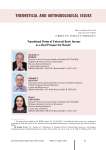
Transitional forms of universal basic income as a real prospect for Russia
Статья научная
The article presents the research results aimed at developing the theoretical provisions of the universal basic income concept summarizing and systematizing the results of a survey of Russian experts conducted by the authors about its principles, the possibilities of introduction in Russia, priority population categories for testing it, assessing the reality of expanding the tools of universal basic income taking into account the development of transitional forms of its use during the COVID-19 pandemic. The work reveals the relevance of UBI concept development in the context of the need to overcome mass poverty in Russia. The result of the theoretical analysis shows that generally recognized UBI principles (universality, unconditionality, individual nature of monetary payments, their regularity) are justified by long-term trends in social policy evolution. The prospect of introducing universal basic income is presented as a qualitative transition (leap) in implementation of the latter. The social policy measures, closest to implementation of UBI principles, are characterized as its transitional forms including experiments on its introduction. To assess the practical feasibility of UBI transitional forms, the article uses the results of a survey of experts from different Russian regions conducted with the authors' participation and a pilot experiment and modeling of the results of UBI toolkit implementation. The paper proposes a possible scheme for implementing UBI tools in Russia, as well as pilot projects for low-income families with children, graduates of universities and secondary vocational educational institutions during the transition from study to the first place of work, the unstable employed (including the unemployed). The authors assess the paradox of activating the implementation of UBI principles in the context of the COVID-2019 pandemic under unfavorable financial conditions as confirming the reality of the prospects for its transitional forms for Russia. The results of the study can contribute to the development of discussions about the introduction of UBI tools in the Russian Federation, and to the promotion of its wide experimental testing for different population categories. It is advisable to continue research in the aspect of analyzing the experience of developing social support in the context of a pandemic and modeling the possible effects and costs of introducing UBI.
Бесплатно
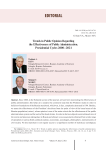
Статья научная
Since 2008, in the Editorial section of the journal, we have been monitoring the effectiveness of public administration; this helps us to analyze the consistent steps that the President makes in order to build new foundations of the Russian statehood, which was, in fact, completely destroyed in 1991. Besides, we assess the effectiveness of the President’s decisions from the point of view of the broad strata of the Russian population (voters), whose opinion is one of the main criteria for the effectiveness of the public administration system and the work of the head of state. In order to form an objective and unbiased view of the events and processes taking place in Russia and abroad, we use assessments obtained from a wide range of specialists in various fields: political analysts, economists, sociologists, philosophers, representatives of civil society. No less important is our regular access to a significant number of statistical, sociological, Russian and foreign databases; by using them comprehensively, we can look at the situation in the country and assess the effectiveness of public administration from the point of view of not only individual experts, but also voters. The main information source of sociological data in our research is the public opinion monitoring that we have been conducting in the Vologda Oblast since 1996. Regularly, once every two months, we carry out a survey covering 1.5 thousand residents of the region, thus obtaining an average annual “cross-section” of public opinion based on the estimates of nine thousand voters representing the main social strata and groups that differ in income, territory of residence, employment, marital status, education and many other socio-demographic characteristics. Due to a monitoring nature of the research, we can observe how, in the course of time, the events and decisions taken by the head of state are lined up in a clear, consistent, logically verified line, which many experts can see. But the majority of voters who observe “with the naked eye” the situation in the country and the actions of the authorities, do not see this line, because it is perceived on a subconscious and routine level, that is, based on the general opinion prevailing in their environment and stereotypes that people develop through their own life experience, the experience of relatives and friends (including negative life experience of the 1990s). This is why our editorial articles often supplement the analysis of latest events and processes in Russia and abroad with a retrospective look at the management decisions that preceded them. We pay special attention to the principle of historicism, and in this regard it is important for us to build a chronology of events. The current article is the last one in 2021; it briefly summarizes the analysis of public administration effectiveness in the context of Vladimir Putin’s presidential terms, with an emphasis on the first four years of the fourth presidential cycle (2018-2021).
Бесплатно
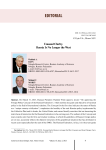
Unusual clarity. Russia is no longer the West
Статья научная
Of the struggle for a multipolar world and for the independence of all national states fighting to preserve and strengthen their national sovereignty against the hegemony of the United States and its satellites. At the same time, making things clear regarding Russia’s foreign policy guidelines allows the President to further improve domestic policy, bring it in line with the status of Russia as a country-civilization in terms of strengthening the foundations of public administration, achieving full national sovereignty and social justice. The article analyzes the adoption of a new Foreign Policy Concept as the President’s next step in the implementation of the general course of national development that he has been in charge of for the past 23 years. We present the relevant expert assessments and the dynamics of public opinion regarding the activities of the head of state. We also look into objective historical prerequisites that determined the specifics of a new Foreign Policy Concept of the Russian Federation, as well as some key tasks that are coming to the fore in domestic policy after the adoption of the Concept. of the struggle for a multipolar world and for the independence of all national states fighting to preserve and strengthen their national sovereignty against the hegemony of the United States and its satellites. At the same time, making things clear regarding Russia’s foreign policy guidelines allows the President to further improve domestic policy, bring it in line with the status of Russia as a country-civilization in terms of strengthening the foundations of public administration, achieving full national sovereignty and social justice. The article analyzes the adoption of a new Foreign Policy Concept as the President’s next step in the implementation of the general course of national development that he has been in charge of for the past 23 years. We present the relevant expert assessments and the dynamics of public opinion regarding the activities of the head of state. We also look into objective historical prerequisites that determined the specifics of a new Foreign Policy Concept of the Russian Federation, as well as some key tasks that are coming to the fore in domestic policy after the adoption of the Concept.
Бесплатно
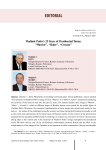
Vladimir Putin’s 25 years of presidential terms: “warrior”, “ruler”, “creator”
Статья научная
October 7, 2024, Minchenko Consulting Communication Group published a report entitled “The dynamics of Vladimir Putin’s image: From a “Warrior” to a “Ruler-Creator”, dedicated to analyzing the activities of the head of state over the past 25 years. The experts identify three images (“Warrior”, “Ruler”, “Creator”), which at different stages of Russian history were typical for the public figure of Vladimir Putin. Moreover, the consistent transformation of these images was determined mainly by two factors - the nature of the challenges facing the country and those facing the President personally, as well as the needs and expectations of the broad strata of Russian society. In the context of the general idea proposed by the specialists of Minchenko Consulting, we express our own point of view on the processes taking place in the country and in the dynamics of Vladimir Putin’s image throughout his presidential terms. We show the key role of the civilizational confrontation between Russia and the West in the transformation of the image of the President as an exponent of public expectations. We pay considerable attention to the analysis of the internal changes taking place in the country, following the results of three years of the special military operation. We present expert assessments characterizing the historical reasons for the special military operation, as well as Russia’s prospects in the emerging multipolar world. The paper also presents data from the current round of the monitoring of managerial decisions adopted by the President and the Government of the Russian Federation; we have been conducting the monitoring for more than two and a half years. Our contribution consists in an in-depth analysis of events and processes taking place in the country, which is presented in a historical context, based on expert assessments from a wide range of specialists in different fields of knowledge (economists, political scientists, sociologists, historians, etc.), as well as on the data of our own sociological surveys conducted in the monitoring mode, current reports in the media, own long-term experience in studying the effectiveness of public administration
Бесплатно
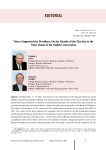
Статья научная
On September 17–19, 2021, the election to the State Duma of the Russian Federation of the eighth convocation took place in Russia. The article analyzes the outcome of the vote according to official data of the Central Election Commission of the Russian Federation. The results of the past elections are considered broken down by federal district, constituent entity, and municipality of the Russian Federation. We analyze the dynamics of the outcome of the parliamentary elections for the period from 2007 to 2021. The results of the latest election are compared with the results of the RF presidential election (2018) and the all-Russian referendum on amendments to the Constitution (2020). We consider the latest parliamentary election in a broad context – as part of the internal Russian political process. In this regard, a significant part of the article is devoted to the analysis of specific managerial decisions made by the Russian President and aimed at addressing the issue of forming a new, post-Soviet statehood, the key elements of which were revealed in the President’s article “Russia at the turn of the Millennium” (1999). Official statistics, independent experts’ assessments and sociological research findings allow us to say that the head of state has adopted comprehensive and consistent decisions to achieve the tasks he formulated in 1999 (the Russian idea, a strong state, an efficient economy); but so far, not all the goals stated in these tasks have been achieved. At a meeting with deputies of the State Duma of the eighth convocation the President noted that the low level of Russians’ income was the main obstacle to stable development and demographic future. And it is the most objective self-assessment of the effectiveness of the entire system of public administration.
Бесплатно
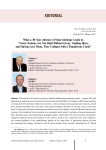
Статья научная
This article is the third in a series of editorial publications released in April – August 2025 and dedicated to analyzing expert opinions on the necessity and feasibility of creating an official state ideology in the country. The relevance of this issue is driven, on the one hand, by national security concerns, which have sharply intensified since the start of the special military operation in Ukraine, and on the other hand, by the goals of national development related to the need to define a vision for Russia's future in the context of the transition from a unipolar to a multipolar world order. A synthesis of expert assessments, facts, statistical data, and monitoring sociological studies, which reflect the state of society and people's subjective opinions about the situation in the country, leads to the conclusion that one of Russia's key internal problems is the unsatisfactory quality of its ruling elites. A significant portion of them are unprepared for change, continue to live by the principles of the country's departing era of “liberal fog”, and in every way, willingly or unwillingly, hinder Russia's transition to a new stage of historical development, thereby jeopardizing its present and future. In this sense, the ideology proposed by many experts, which would be “mandatory for those who aspire to join the cohort of leaders of the Russian state” (S.A. Karaganov), appears to the authors as a completely logical and necessary step on the part of the President and the ruling political party. As long as there is no clear answer to the question “What kind of state are we building?” at all levels of government, such an answer is also absent among the general public, and as a consequence, people's real lives often diverge from the public rhetoric of the authorities. The article focuses on the practical possibilities of implementing an ideology that could take on the character of a “philosophy of a common destiny” (Zh.T. Toshchenko) and form the basis of a new Social Contract, the need for which many experts have noted for our country. The authors' contribution consists of the systematization of expert opinions, statistical data, and public opinion polls covering Russia's historical development from the late 1990s (from the final years of Boris Yeltsin's presidency), as well as actual cases of corruption and high treason within the country's ruling elites (which primarily indicate that many of their representatives cannot be relied upon, as they are guided by personal interests that differ from the interests of the country, state, and society), and the administrative decisions made by the President, the Government, and the State Duma of the Russian Federation in the context of the pressing task of developing an ideology and forming a new Social Contract in Russia
Бесплатно
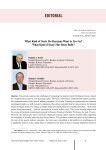
What kind of state do Russians want to live in? What kind of state has been built?
Статья научная
This article examines the challenge of translating the desired vision for Russia's future, shared by a majority of its citizens, into practical reality. The issue's relevance is analyzed both before and after the commencement of the special military operation in Ukraine. Drawing on nationwide and regional sociological studies, as well as expert evaluations, the authors conclude that for most citizens, the desired future for Russia is that of a strong, sovereign nation grounded primarily in traditional values – with social justice being paramount – and the principles of a social welfare state. This vision broadly aligns with the course of national development pursued by Russian President Vladimir Putin over the past 25 years. However, the authors also note a persistent skepticism among experts and the broader public regarding the feasibility of actually achieving this desired future. This problem existed both prior to and following the start of the special military operation. Its root cause is identified as the inability or unwillingness of a significant portion of the ruling elites to implement the head of state's strategic objectives aimed at strengthening national sovereignty. As a result, the future of Russia remains uncertain in the eyes of many of its citizens. Consequently, Russia's struggle for continued sovereign development is framed not only as a conflict with the Collective West but also as an internal battle against the nation's own protracted domestic issues. For the President, a key imperative thus becomes laying the groundwork to bring the system of state governance into alignment with the public's vision for the country's future. This entails, above all, concluding the special military operation on terms favorable to Russia and selecting a successor capable of continuing and reinforcing the quarter-century-long course of national development. The empirical foundation of the research is based on the authors' own sociological monitoring data, nationwide surveys, and assessments from a broad spectrum of experts. The authors' contribution lies in developing the theoretical and methodological framework for scholarly inquiry into defining the contours of Russia's future vision and identifying the obstacles to its practical implementation.
Бесплатно
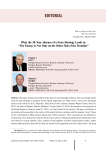
Статья научная
The paper analyzes the problem of the lack of a state ideology in Russia. The increasingly urgent need for state ideology is indicated by the regular appearance of “black swans” such as the attempted armed coup carried out by E. Prigozhin, head of the private military company Wagner Group (June 24, 2023), the arrest of Deputy Defense Minister T. Ivanov (April 23, 2024), the detention of ex-governor of the Kursk Region A. Smirnov (April 15 2025), etc. Such events in the country’s life pose a real threat to national security, especially in the context of the special military operation and the ongoing “acute” phase of the civilizational conflict between Russia and NATO countries. Their consequences are difficult to overestimate, since human lives and the threat to the existence of Russian statehood are behind them. Our view (based on expert opinions, facts, analysis of the legislative activities of government bodies, public opinion polls) proceeds from the fact that the reason for the appearance of such “black swans” has deep socio-cultural and moral grounds: corruption at all levels of government, inability and unwillingness of the ruling elites to meet the agenda of the future dictated by SMO goals; they are a consequence of the deformation of the “cultural code” of the Russian civilization, which occurred as a result of almost 35 years of influence of the Western culture of the “consumer society” on the consciousness of Russian society. This is especially true with regard to the country’s ruling elites - in relation to them, we should talk about the almost 70-year period (since the time of the Khrushchev Thaw) of the penetration and dominance of Western values, which are based on the achievement of personal material gain. The experience of the Republic of Belarus, where Directive 12 “On the implementation of the foundations of the ideology of the Belarusian State” was adopted on April 9, 2025, also indicates that in the current extremely difficult geopolitical conditions, the need for a state ideology has objectively matured. At the same time, despite the active policy of the state to combat corrupt officials in the management system, to create educational conditions for the prevention of this problem in the long term, for future generations of Russians, it has not yet been possible to solve it. Many experts point out that this cannot be done without an appropriate “ideology of rejection of corruption”, both among civil servants and in society as a whole. Our contribution consists in analyzing the socio-cultural and historical foundations of the current state of the problem of corruption in power and, more broadly, considering it as one of the many manifestations of the value orientations of a significant part of the ruling elites formed under the dominance of the Western ideology of the “consumer society”
Бесплатно
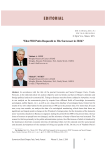
What will Putin bequeath to his successor in 2024?
Статья научная
In accordance with the title of the journal Economic and Social Changes: Facts, Trends, Forecast, in the editorial article we analyze objective and real trends and facts in Russia’s domestic and foreign political and socio-economic life. Trying to distance ourselves from a subjective viewpoint, we rely in our analysis on the assessments given by experts from different fields of knowledge (economists, sociologists, public figures, etc.), as well as on a long-term database of sociological data, formed on the results of our own observations for the period since 1996 up to the present time. For more than 20 years now, every two months, we analyze the data of a sociological monitoring, which shows that there are significant and largely positive changes in the President’s foreign policy, but the dynamics of the domestic socio-economic situation in Russia are stagnant: during the period from 2000 to the present time, the key issues of concern to people have not changed, and the relevance of many of them has even increased...
Бесплатно
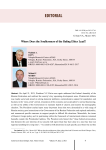
Where does the soullessness of the ruling elites lead?
Статья научная
On April 21, 2021, President V.V. Putin once again addressed the Federal Assembly of the Russian Federation and outlined the country's key upcoming development areas. Presidential Address was mostly social and aimed at solving domestic problems: comprehensive support for population and business in the “post-covid” period, restoration of the economy and social sphere's normal functioning, as well as the ability of the Government to maintain health of citizens and improve the demographic situation. The President touched upon many important issues that were demanded by a wide range of Russian society, gave instructions to the Government of the Russian Federation and regional authorities, and announced specific measures to support people in difficult life situations. Meanwhile, the issues of Russia's foreign policy and its positioning within the framework of international relations remained basically outside this Presidential Address. The President only hinted that “those behind provocations that threaten the core interests of our security will regret what they have done in a way they have not regretted anything for a long time”, “we ourselves will determine in each specific case where the red line will be drawn with regard to Russia”. However, as many experts note, after the victory of J. Biden in the US presidential election, there was the beginning of the culmination of the struggle between global forces for the return of dominant positions in the world that they have gradually lost over the past decades, for a unipolar or multipolar form of the future world order, prospects for the transition of world civilization from modernism to postmodernism. In these conditions, the issues related to Russia's civilizational self-determination and awareness of a kind of the state we are building, reasons that prevent us from effectively implementing the welfare state principles in the country, many of which were embodied in the amendments to the Constitution of the Russian Federation in July 2020, become more relevant than ever.
Бесплатно

